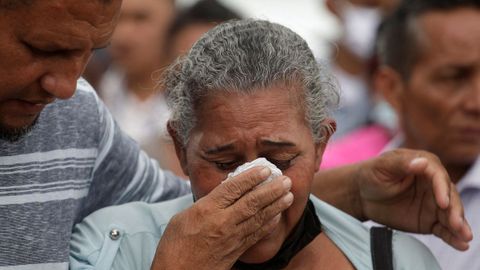
Relatives of prisoners in front of the prison in Honduras where 46 women died FREDY RODRIGUEZ | Reuters
The trigger for the massacre was a gang fight
A terrible prison tragedy in Honduras. The authorities of that Central American country confirmed yesterday the death of at least 46 female prisoners in the violent events that took place this Tuesday in the Women’s Center for Social Adaptation (Cefas), a women’s prison located about 25 kilometers from the capital Tegucigalpa.
The massacre was “planned by gangs” [pandillas] in full view of the patience of the security authorities,” said the country’s president, Xiomara Castro. The progressive leader assured that she would take “more drastic measures,” but did not announce what kind.
The altercation began, according to the version of the police spokesman, when a large group of gang members from Barrio 18 overpowered their guards and heavily armed entered the place where dozens of women belonging to the rival gang Mara Salvatrucha were. The victims died from burning and also from bullet wounds and white weapons.
Both groups, formed in the late 1980s in the USA, have been facing each other for more than two decades on the streets of Honduras, El Salvador and Guatemala.
In Honduran prisons, it is not uncommon for inmates to bribe or extort guards to obtain weapons, and prison massacres are a recurring occurrence in an overcrowded and neglected prison system. Human Rights Watch also condemned in a 2021 report that “poor sanitation, beatings, gang violence, and inmate murders are endemic” in Honduran prisons. There were between 800 and 900 prisoners in Čefas, twice its capacity.
ministerial change
On Tuesday, Castro dismissed Security Minister Ramón Sabillon, who will be replaced by Gustavo Sánchez, the current director of the National Police.
The operation to regain control of the prison was coordinated by Undersecretary Julissa Villanueva, who in April announced a plan to intervene in prisons, prevent telephone communications and disarm prisoners. Villanueva assured yesterday that the massacre in Cefas happened in response to the intervention announced in three prisons in the country.
Honduras is one of the most violent countries in the West. At the end of 2022, Castro began a harsh policy, similar, although more relaxed, to the one implemented in El Salvador by the administration of Nayib Bukele.
The progressive president imposed partial states of emergency in dozens of the country’s most violent municipalities, suspending some constitutional rights and making arrests of suspects more flexible.
Assessing the response to the attacks, the authorities yesterday began conducting the first autopsies and handing over the bodies of the prisoners to their relatives.
Source: La Vozde Galicia
I am Amelia James, a passionate journalist with a deep-rooted interest in current affairs. I have more than five years of experience in the media industry, working both as an author and editor for 24 Instant News. My main focus lies in international news, particularly regional conflicts and political issues around the world.







